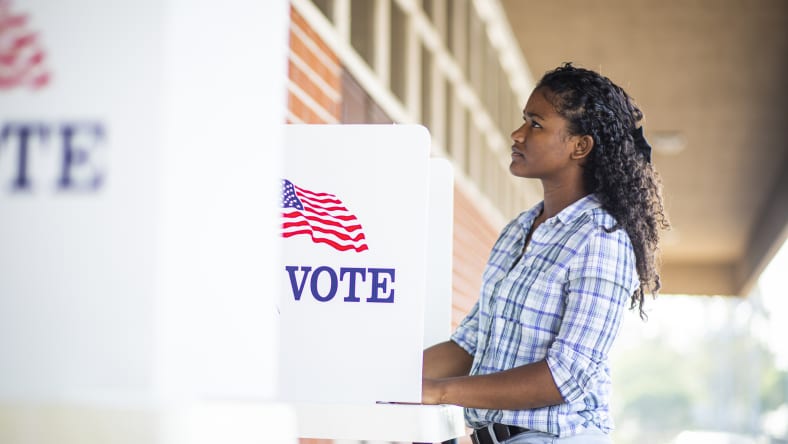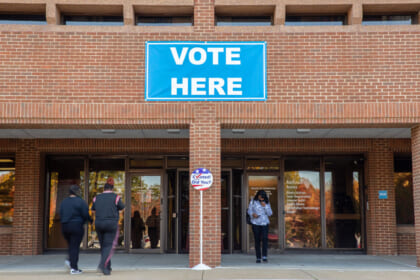OPINION: By voting on Election Day, our collective power will continue to move America closer to its promise for all.
Black Women’s Leadership Collective |
Nov 5, 2022
 (Getty Images)
(Getty Images)Black women are a voting powerhouse. When we show up at the polls, we bring our communities with us and decide elections. In 2020, we turned out in record numbers and helped change the direction of our country. We made it clear that nothing and no one could stop us. In this 2022 midterm election season, our futures, our livelihoods, and basic freedoms are on the ballot. It is again time to organize and mobilize every man, woman and young voter in our communities and vote.

Also Read:
Black votes do matter — if we vote
As leaders of the Black Women’s Leadership Collective — an organizing hub for Black women’s organizations, advocates and supporters representing over 19 million Black women across America — we know just how strong our power is. Together we helped elect Kamala Harris as the first Black woman vice president. By electing President Joe Biden and Vice President Harris, we made it possible for their administration to implement a COVID-19 recovery plan and get vaccines into our communities, lift 716,000 black children out of poverty, give young people up to $20,000 in student loan debt relief, lower prescription drug costs with a $35 cap on insulin and change federal policy on marijuana possession. And, after fierce organizing throughout Justice Ketanji Brown Jackson’s nomination process, Black women helped her take her rightful seat on the nation’s highest court. But that’s just the start, so together we must make it clear: We won’t let anyone stop us now.
While the country has begun to make progress on a number of issues, there is more work to do to create sustainable change and equity for Black women, our families and our communities. From criminal justice reform, codifying voting rights, help for families including access to affordable child care, getting weapons of war off our streets, to strengthening our democracy at every level, the solutions aren’t going to come from right-wing politicians — they come from us and the leaders we elect and hold accountable. And, with the Supreme Court’s decision to overturn Roe v. Wade and strip away our freedom to control our own bodies, we must elect leaders who will codify reproductive freedom, including access to abortion. There are some who want to pass a national ban on abortion on top of the extreme new measures we are seeing across the country that criminalize women and their doctors. We remember a time when our bodies were treated as property; some said we were less than human and that we couldn’t be trusted with freedom. We are not going back.

(Getty Images)
Not surprisingly, a recent poll from Higher Heights Leadership Fund found that Black women are highly motivated to vote in the 2022 midterm elections with 80 percent saying that we have the power to make change on issues that matter most to our community. We also know how important it is that we make a plan to vote and then encourage our family and friends to do the same. Making a plan is easy; start by deciding if you will vote by mail, early in person or in person on Election Day, Tuesday, Nov. 8. Visit vote.org to make your plan to vote right now.

The Higher Heights poll also found that a large majority of Black women agree that while we have made great strides, Black women are still underrepresented in the halls of power. In fact, while we are the largest voting bloc in America, there are currently no Black women in the U.S. Senate or serving as governor, but there are Black women running for both as well as elected office up and down the ballot. Fortunately, a record number of Black women are running for office across our country in 2022, and we have the opportunity to elect more Black women to every office from mayor to city council to state legislatures to governors, Congress and the U.S. Senate. You can learn more about the Black women running for office in 2022 here. Electing more Black women means more spaces where our lived experience is represented and part of the decisions that get made on the issues that directly impact our lives.
Not surprisingly, a recent poll from Higher Heights Leadership Fund found that Black women are highly motivated to vote in the 2022 midterm elections with 80 percent saying that we have the power to make change on issues that matter most to our community. We also know how important it is that we make a plan to vote and then encourage our family and friends to do the same. Making a plan is easy; start by deciding if you will vote by mail, early in person or in person on Election Day, Tuesday, Nov. 8. Visit vote.org to make your plan to vote right now.

The Higher Heights poll also found that a large majority of Black women agree that while we have made great strides, Black women are still underrepresented in the halls of power. In fact, while we are the largest voting bloc in America, there are currently no Black women in the U.S. Senate or serving as governor, but there are Black women running for both as well as elected office up and down the ballot. Fortunately, a record number of Black women are running for office across our country in 2022, and we have the opportunity to elect more Black women to every office from mayor to city council to state legislatures to governors, Congress and the U.S. Senate. You can learn more about the Black women running for office in 2022 here. Electing more Black women means more spaces where our lived experience is represented and part of the decisions that get made on the issues that directly impact our lives.

Also Read:
Oprah delivers November surprise, endorses Fetterman over Oz
Together in this 2022 midterm election, our collective power will continue to move America closer to its promise for all. We won’t be stopped.
This op-ed was written by three leaders of the Black Women’s Leadership Collective (BWLC) – Donna Brazile, former chair of the Democratic National Committee (DNC), Bishop Leah Daughtry, co-convener of Power Rising, and Karen Finney, CNN political commentator.
No comments:
Post a Comment